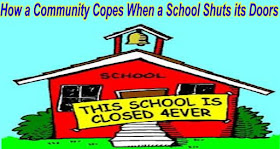How a Community Copes When a School Shuts its Doors
Shuttered schools can devastate communities. For a small Iowa town, losing its high school felt like losing a member of the family.
After 34 years of teaching math and science at Farragut Community High School in Fremont County, Iowa, Harold Dinsmore officially retired in 1992. Nine years later, he “retired” again, after he was called back to finish out the 2001 school year while administrators found a permanent chemistry teacher. In 2015, he went back again to close out the school’s last semester. This time, there would be no going back to the town’s only high school.
Last summer the school—a fixture in the community, since its creation in the 1920s—was “involuntarily dissolved.”
“It tears me up. It shouldn’t have happened,” says Dinsmore. “I was fortunate to have all my children go to that high school, and I’m very proud of [it].”
Dinsmore says his colleagues were proud of the school, too, and their pride made them active in the school’s life. “We all worked together and all of our school programs were strong,” he says, noting that when there was a game, Farragut’s bleachers were usually filled to capacity. “The school gave everyone a great foundation to succeed in life,” he adds.
Hometown Pride
Farragut is a small farming town established in 1870, and named after Admiral David Farragut—the nation’s first vice admiral to the U.S. Navy. He is remembered for making the cry, “Damn the torpedoes, full speed ahead,” (paraphrased) during the victorious 1864 Battle of Mobile.
Dinsmore’s daughter, Marcia Johnson, lives and works in Shenandoah—a neighboring school district—where she teaches third grade and serves as the local president for the Shenandoah Education Association.
We all worked together and all of our school programs were strong. The school gave everyone a great foundation to succeed in life” – Harold Dinsmore
Johnson attended Farragut in the 1980s, and her high school memories are fond. “I loved being in a small school. We were involved in everything,” she says, firing off a laundry list of activities from music to sports, and “all” of the school clubs. She knew everyone, too: classmates and their siblings, teachers and their children.
During Johnson’s era, the school was known for the girls’ basketball team, which traveled to state championship games every year. “That was our claim to fame,” she proudly says.
The classes that followed Johnson’s won state competitions in speech, volleyball, and softball. Trophies filled display cases. And graduates’ academic efforts led How a Community Copes When a School Shuts its Doors:

